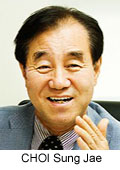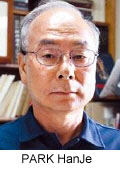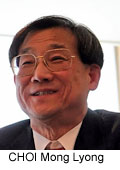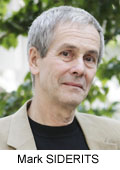 "As much as I have specialized in the welfare of the elderly I feel ambivalent towards 'retirement'," said Professor CHOI Sung Jae."I'm looking forward to applying to myself my research on psychological changes after retirement."
"As much as I have specialized in the welfare of the elderly I feel ambivalent towards 'retirement'," said Professor CHOI Sung Jae."I'm looking forward to applying to myself my research on psychological changes after retirement."
Professor Choi has served as chair of the Korean Academy of Social Welfare and Korean Gerontological Society for his distinguished contributions to the field. He is also the Asia-Oceania regional chairperson in the International Association of Gerontology and Geriatrics. Professor Choi plans on building an age-integrated social system model which emphasizes the reeducation and reorganization of senescent people.
"Social security is not only about helping people in need but about constructing a basic system for every citizen," he said."Korea now has the foundation upon which to develop into a welfare nation. The next challenge is applying research models from welfare states and modifying them to fit the Korean social and cultural tradition."
Prof. PARK HanJe (Dept. of Asian History, College of Humanities)
 Professor PARK HanJe, having entered SNU as a freshman in 1968, is the first generation of SNU's Asian history scholars as the department was newly founded in 1969. Professor Park proudly stated,"When the Department of Asian History was first established there were almost no research materials in the country. We now stand in the company of other distinguished schools of Asian history."
Professor PARK HanJe, having entered SNU as a freshman in 1968, is the first generation of SNU's Asian history scholars as the department was newly founded in 1969. Professor Park proudly stated,"When the Department of Asian History was first established there were almost no research materials in the country. We now stand in the company of other distinguished schools of Asian history."
Professor Park created a reverberation in the field of Asian history in the 1980s by stating Chinese culture was an integration of the nomadic tribe 'Ho' and the agricultural tribe 'Han'. Professor Park believes Korea's foreign policy toward China can only succeed with understanding of the development of Chinese culture from 56 different ethnicities within China.
Professor Park, who declared he will"continue his research" even after retirement, entreated SNU students to follow the example of his favorite historical character Yan Zhitui (顔之推), the author of The Family Instructions of Master Yan (顔氏家訓), who"always lived in contemplation of history".
Prof. CHOI Mong Lyong (Dept. of Archaeology, College of Humanities)
 Professor CHOI Mong Lyong sees his leaving SNU as a"new start". He is renowned for actively publishing archaeology related books every year during his tenure at SNU. Professor Choi is the author of forty or so history books, including the most recent 21st Century Korean Archaeology I ~ V which he put forth in 2006 in preparation of his retirement five years later.
Professor CHOI Mong Lyong sees his leaving SNU as a"new start". He is renowned for actively publishing archaeology related books every year during his tenure at SNU. Professor Choi is the author of forty or so history books, including the most recent 21st Century Korean Archaeology I ~ V which he put forth in 2006 in preparation of his retirement five years later.
Appointed as a professor at Chonnam National University at the age of 26, he has served as an invaluable researcher of Korean archaeology. Looking back over his forty years as a professor he counted Korean history textbook compilation and the establishment of the Korean Ancient History Society as his two most memorable contributions to the field. Professor Choi entreated,"…a scholar must incessantly find faults in past accomplishments. Do not settle on present theories and keep searching for new ones."
Prof. Mark Siderits (Dept. of Philosophy, College of Humanities)
A Walk Through Philosophical Thought Across Eastern and Western Traditions
 Professor Mark Siderits, who joined the faculty of SNU in 2008, upon leaving said his stay at SNU"was too short but very enjoyable" and that"it will serve as a foundation for new research."
Professor Mark Siderits, who joined the faculty of SNU in 2008, upon leaving said his stay at SNU"was too short but very enjoyable" and that"it will serve as a foundation for new research."
Before coming to SNU Professor Siderits had taught at Illinois State University for 28 years. Using analytic philosophy to reinterpret Buddhist scriptures, Professor Siderits describes his research as solving a big puzzle."Philosophers of the West and the East have each developed their line of thinking according to different philosophical traditions in view of the identical puzzle. Combining the two is an infinite field of study that can lead to new answers."
Thus the reason Professor Siderits decided to come to SNU was because he believed Korea was an appropriate environment for studying the encounter between Western and Eastern philosophies."Korea is in a unique situation; though it has been under the influence of Eastern philosophical tradition, it has received Western philosophical thought as well." He also said it assisted his research reading Sanskrit scriptures with SNU graduate students, which he could not do with American students who were not already familiar with Eastern philosophies.
Professor Siderits states that the belief that Korean students are inactive in class is a stereotype."At first I was anxious about whether class discussions would work with Korean students, but after a bit of ice-breaking everyone participated with enthusiasm. In fact their philosophical interest is greater than in the States, which makes me think it might be due to the influence of Confucianism that their respect for learning is so great."
The professor plans to continue his lectures and research throughout the world after leaving SNU. His explanations of philosophical thought balancing both Eastern and Western perspectives will be anticipated by all.
Prof. KWON Byung Doo (Dept. of Earth Science Education, College of Education)
Professor KWON Byung Doo began,"It was a pleasure to teach and be with the best students in the nation for thirty or so years."
He recalled how immature the field of earth science was in Korea even in 1977 when he returned to Korea after studying petroleum exploration techniques in the States."There were only a few researchers and no equipment for geology explorations."
Thus Professor Kwon worked hard to establish independent exploration methods by researching and analyzing the continental shelf of the nation at a time when explorations of most underground resources were led by foreign countries. Now, Professor Kwon is able to smile contentedly at his students now well advanced in their fields of expertise.
However, Professor Kwon stated that difficulties in the field of earth science still remain, especially because earth science is not included in the subjects tested on the CSAT (suneung). Since the CSAT is the test of their lives for students in Korea, it cannot help but be ignored on the education scene."Even SNU students," he said,"take more interest in classes such as
Nevertheless, Professor Kwon believes"The social importance of earth science cannot be overemphasized because alternative energy and development of eco-friendly resources are the agenda of the era."
Written by LEE BoYoung, SNU English Editor, boey09@snu.ac.kr ?
Reviewed by Eli Park Sorensen, SNU Professor of Liberal Studies, eps7257@snu.ac.kr
Proofread by Brett Johnson, SNU English Editor, morningcalm2@gmail.com

